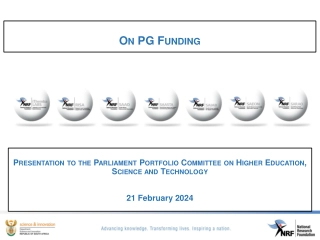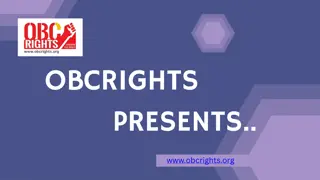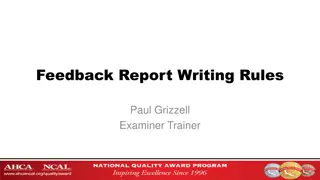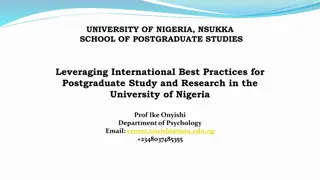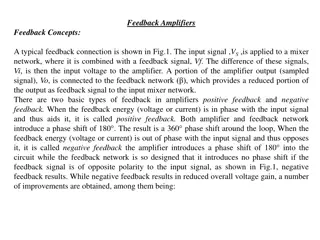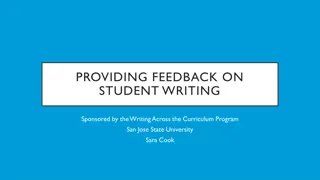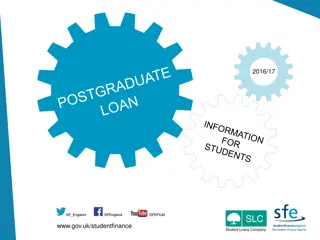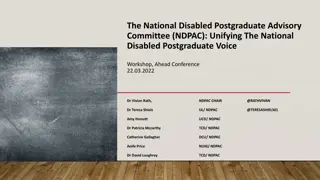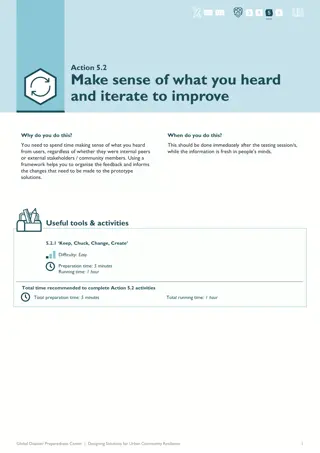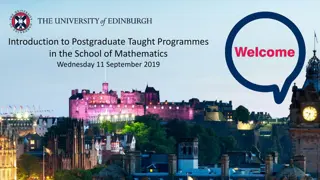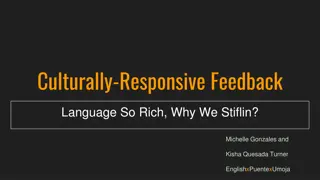Enhancing Postgraduate Academic Writing: Feedback Collaboration Model
Developing a collaborative model for postgraduate academic writing courses involves understanding the role of feedback, focusing on content feedback, and exploring the intersections between discipline specialist and writing tutor feedback to improve academic writing abilities. Feedback offers valuable insights to writers, guiding them in audience expectations, subject matter acquisition, and argument patterns. Writing tutors emphasize content over language and structure, acknowledging the importance of knowledge domains and the presentation of concepts in academic writing.
Uploaded on Sep 13, 2024 | 1 Views
Download Presentation

Please find below an Image/Link to download the presentation.
The content on the website is provided AS IS for your information and personal use only. It may not be sold, licensed, or shared on other websites without obtaining consent from the author. Download presentation by click this link. If you encounter any issues during the download, it is possible that the publisher has removed the file from their server.
E N D
Presentation Transcript
EAP AND SUBJECT SPECIALIST ACADEMIC WRITING FEEDBACK COLLABORATION. Jill Northcott and David Caulton ELE, University of Edinburgh Addressing the State of the Union: Working Together = Learning Together. BALEAP Biennial Conference. Bristol. 7-9 April 2017
Overview 1. Introduction and background: developing a collaborative model for postgraduate academic writing courses. 2. Focus on feedback 3. Content vs language vs structure? ELE tutor approaches to content feedback. 4. Discipline specialist and writing tutor feedback crossover. 5. Conclusions and implications.
Collaborative ESAP academic writing courses. Northcott, J., Gillies, P. and Caulton, D. (2017) Feedback on feedback. The role of ESAP tutor feedback in improving postgraduate academic writing ability. In Kemp, J. (ed.) EAP in a rapidly changing landscape: issues, challenges and solutions. Reading: Garnet Publishing. Northcott, J., Gillies, P. and Caulton, D (2016). What postgraduates appreciate in online tutor feedback on academic writing. Journal of Academic Writing 6: 1 http://dx.doi.org/10.18552/joaw.v6i1.268
Feedback offers the writer an outsiders view of a text and so provides a sense of audience and what the audience values in writing , contributing to his or her acquisition of disciplinary subject matter and patterns of argument and evidence . Hyland 2013b: 180
Writing tutors concepts of content: 4 Qs 1. What do you understand by 'content' as opposed to 'language' and 'structure'? 2. Where do you see the boundaries (if any) between 'content', 'language' and 'structure'? 3. Which of those three aspects do you put emphasis on giving feedback on? 4. Are you comfortable giving feedback specifically on 'content'? Why/Why not? What, if anything, does it depend on?
Definition of content? domains of knowledge which the average educated native speaker could not reasonably be expected to be familiar with. Tudor 1997 (cited in Basturkmen 2010: 8)
Content v Form Content = understood as the concepts, procedures, theories and understandings of a discipline Form = the rhetorical presentation of these in ways that will impress insiders Hyland 2013a: 245.
1. What do you understand by 'content' as opposed to 'language' and 'structure'? The subject matter; ideas which are related to the topic as opposed to the language used to talk about them and the way they are organised. (WT 7) Content is engagement with the topic, such as citing, evidence, supporting points, argumentation and rebuttal of counterarguments. (WT 6)
2. Where do you see the boundaries (if any) between 'content', 'language' and 'structure'? Language and structure could be general academic , ie applicable in any field, whereas content is subject specific. (WT 7) Argument logic and coherence falls under content and underlying structure. Language is the cohesive packaging of meaning, which falls under surface structure. (WT 6)
3. Which of those three aspects do you put emphasis on giving feedback on? Language (when it is generic academic, not subject- specific) and structure. (WT 7) I have tended to feel that my role was to focus on language and structure first. In a situation where I had experience of the subject area, I could perhaps advise in terms of content, certainly in terms of source choice, and the need to bring sources and ideas into dialogue - how to make choices about and manage content, perhaps. (WT 10)
4. Are you comfortable giving feedback specifically on 'content'? Why/Why not? What, if anything, does it depend on? It depends very much on the subject, but in general, only in as much as the content does not deal with the question/title. If poorly written, it is obvious that some other content would improve the essay - e.g. examples, data to support a point; evidence of reading. (WT 2) It depends on how much knowledge I have of the subject in question. However, one of my methods of feedback on content is to ask questions. If a counterpoint occurs to me, for example, I wouldn't shy away from asking a simple question about this 'Could you mention X here?'. I might be wrong - I have to trust that the student is in control of their own content - but at least I've put the thought in the student's mind, and opened a dialogue with them in feedback I'm not afraid to provide this sort of conversation- starting feedback, even if the topic is far out of my comfort zone. I'm the audience at that moment, after all, and it's my duty to at least investigate why something feels incomplete or ambiguous, where possible. (WT 10)
Discipline specialist and writing tutor collaboration collaboration of a discipline specialist, who brings their experience to bear on the content, and a writing advisor who brings their understanding of discourse and writing , results in a much closer focus on meaning the artificial separation between language and content often becomes blurred and disappears. This blurring reflects the ways that writing and knowledge are not distinct from the meaning and knowledge being represented (Ingle 2016: 158)
Data sources Written feedback provided by: discipline specialists on the final drafts of essays produced by PG students in Social and Political Sciences (SPS) and Medicine, Dentistry and Veterinary Medicine (SAW) writing tutors on draft sections of these essays.
Discipline Specialist Marking Criteria 1. Critical/conceptual analysis 2. Strength/cohesion of argument 3. Use of sources/evidence 4. Structure and organisation 5. Breadth and relevance of reading 6. Clarity of expression, presentation and referencing
Excerpts illustrating three areas relating to content 1. Critical/conceptual analysis 2. Strength/cohesion of argument 3. Use of sources/evidence
Strength/cohesion of argument: Writing tutor feedback You do need a clear thesis statement You perhaps need to make your thesis statement (answer to the essay question) slightly clearer You need to make your thesis statement stronger make it clear that this is your view From this introduction it is not obvious to me that you are going to address the question fully Does the essay question ask you to do this? I really like your thesis statement
Discipline specialists You do make your position clear in the beginning which is good. It would be good to state why you are arguing your position. You also need to relate your points back to the argument, ensuring that they fit into the essay as a whole. The introduction would also have benefitted from a statement of the main points you intended to explore in order to make the argument (SPS) The argument is very unclear and I am not convinced you have entirely understood the question. When you write your argument out be sure that you are speaking directly to the question, stating which side you are arguing and sticking to that throughout the question. The biggest weakness of the essay is that there was no real argument until the very last line. (SPS)
Use of sources/evidence: writing tutor feedback You need to link your evaluation of academic sources to the point you wish to make. Would you like to include some examples here to support your claim? You have integrated your sources and engaged with their views in a way that demonstrates your understanding of the issues involved. Could you give me one or two concrete examples? This is more a summary of the literature and stating which sources agree/disagree. You need to express your thoughts on the literature. This is very good you are clearly comfortable with taking other people s ideas and running with them, yet doing so critically and using them to underpin your arguments. You have evaluated your sources but in places it is not entirely clear how they fit in with your argument
Discipline specialist feedback There are some points that could have been elaborated further, however. Arguments are often too vague; lack elaboration, explanation and examples Some numerical data on animal experimentation could be added to indicate trends towards more or less use of animals (SAW) There are many places where you make points but no examples or evidence is provided You develop a strong argument that draws on a range of examples and statistical evidence to back up your claims Although you have a good number of sources, you only scratched the surface of the issues they raise. For example, your discussion of the relationship between social democracy and welfare states is vague and underdeveloped. using the literature to demonstrate your understanding of opposing claims and counter-arguments
Discipline specialist feedback While you have consulted a good range of sources, you tend to rely on one source more than others (Hulme & Scott). You should try to incorporate the breadth of your sources more equally. This section could be developed further at the moment it is very descriptive, but could be made stronger and more critical, by linking this in with theories/concepts such as, for example, soft power or hegemony.
No crossover critical/conceptual analysis See comments on the example of P which could be further developed and discussed in terms of X and Y for example Orford s narrative lens would have added some analytical depth Grasps some of the nuances of the notion of human rights Making the links between class and democracy more sophisticated
1. Critical/conceptual analysis 2. Strength/cohesion of argument 3. Use of sources/evidence 4. Structure and organisation 5. Breadth and relevance of reading 6. Clarity of expression, presentation and referencing
Conclusion Partnership would seem to be a very effective (the best?) way of ensuring useful feedback on both disciplinary content and form.
.and implications for EAP? Areas where writing tutors are competent feedback providers links to learning transfer research (cf James 2006) and may suggest the importance of feedback in this area. Greatest gains from EAP instruction found in academic writing recognise coherent relationships; organise ideas, develop topics and establish coherence in academic writing; reference appropriately (Terraschke & Wahid: 174)
References Basturkman, H. (2010) Developing Courses in English for Specific Purposes (UK: Palgrave Macmillan) Hyland, K. (2013a) Faculty feedback: Perceptions and practices in L2 disciplinary writing. Journal of Second Language Writing 22, pp. 240 253 Hyland, K. (2013b) Student perceptions of hidden messages in teacher written feedback . Studies in Educational Evaluation 39, pp. 180 187 Ingle, J. (2016). Engaging with Academic Writing and Discourse . In Pokorny, H. & Warren, D. (eds) Enhancing Teaching Practice in Higher Education (Sage: London). James, M. A. (2006). Transfer of learning from a university content-based EAP course. TESOL Quarterly, 40(4), pp.783 806 Terraschke, A. & Wahid, R. (2011) The impact of EAP study on the academic expectations of international postgraduate students in Australia. Journal of Academic Writing 10, pp 173-182. Tudor, I. (1997) LSP or Language Education? in R. Howard and G. Brown (eds) Teacher Education for LSP (Clevedon: Multilingual Matters), pp.90-102.
jill.northcott@ed.ac.uk david.caulton@ed.ac.uk


